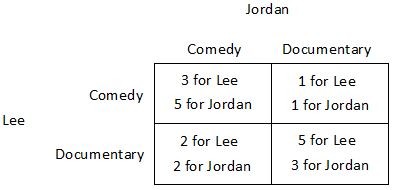Suppose Jordan and Lee are trying to decide what to do on a Friday. Jordan would prefer to see a comedy while Lee would prefer to see a documentary. One documentary and one comedy are showing at the local cinema. The payoffs they receive from seeing the films either together or separately are shown in the payoff matrix below. Both Jordan and Lee know the information contained in the payoff matrix. They purchase their tickets simultaneously, ignorant of the other's choice. Suppose a timing element is added to the game, and that Jordan buys a ticket first. Then, after seeing Jordon's choice, Lee buys a ticket. What will be the equilibrium outcome?
Suppose a timing element is added to the game, and that Jordan buys a ticket first. Then, after seeing Jordon's choice, Lee buys a ticket. What will be the equilibrium outcome?
A. Jordan will buy a ticket to the documentary and Lee will buy a ticket to the comedy.
B. Jordan will buy a ticket to the comedy and Lee will buy a ticket to the documentary.
C. Both Jordan and Lee will buy a ticket to the documentary
D. Both Jordan and Lee will buy a ticket to the comedy.
Answer: D
You might also like to view...
Which of the following is true?
i. Production efficiency occurs only when resources are used to produce the combination of goods that has the greatest value. ii. Allocative efficiency occurs when marginal benefit equals marginal cost. iii. A demand curve is a marginal cost curve. A) only ii B) only i C) only iii D) i and ii E) ii and iii
If the U.S. government increased its spending by $100 billion and increased taxes by $100 billion, the net effect on Aggregate Demand would be:
a. Neutral (i.e., no change in aggregate demand). b. To increase aggregate demand. c. To decrease aggregate demand. d. To increase aggregate supply. e. To decrease aggregate supply.